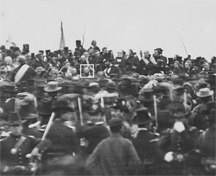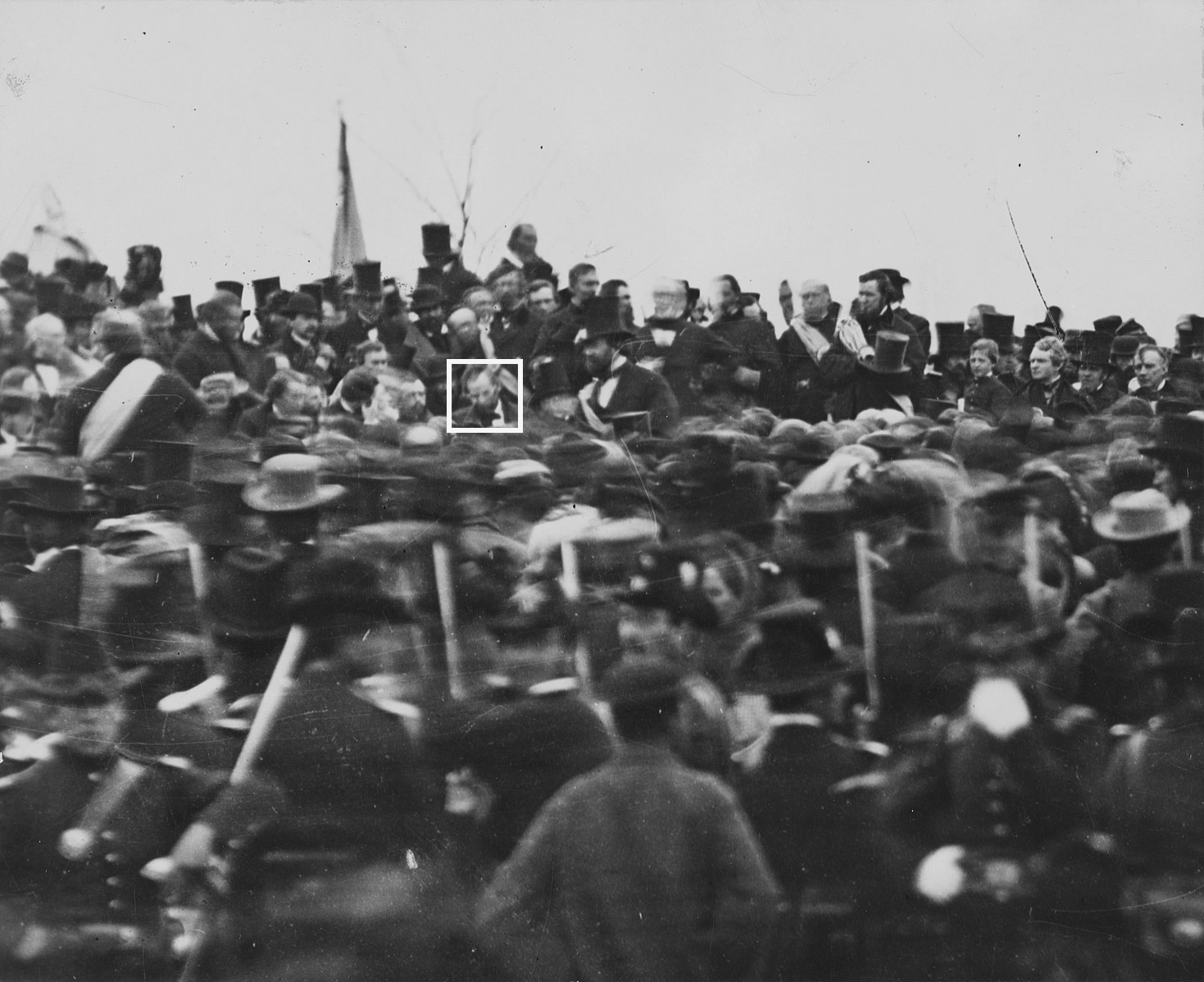
President Abraham Lincoln delivers the Gettysburg Address, November 19, 1863. Some of the more powerful phrases he spoke that day still echo across the United States, even though his speech, at two minutes 46 seconds and only 272 words, was the shortest given that day. View a larger image
Image attributions vary, but visit Wikimedia for details and a fascinating history of this image.
Lists of  tips for memorable presentations or memorable articles often include suggestions to tell stories, be engaging, use humor, and so on. This is all good advice. To that extensive list, I would add one item: give your audience what they'll need when they're telling someone else about your work. That is, support word-of-mouth about your content.
tips for memorable presentations or memorable articles often include suggestions to tell stories, be engaging, use humor, and so on. This is all good advice. To that extensive list, I would add one item: give your audience what they'll need when they're telling someone else about your work. That is, support word-of-mouth about your content.
Most Something magical happens when you create
your work with word-of-mouth in mindcreators who make conscious efforts to support word-of-mouth about what they create do so as an add-on, after the creative work is largely complete. But something magical happens when you create the work with word-of-mouth in mind. This post contains suggestions for doing exactly that. For example, the first suggestion below is to "Focus on what's most important," and avoid trying to do too much. It's advice that's a bit easier to follow when you remember that your auditors can repeat to others only what they can remember. With all this in mind, here are some concrete suggestions for supporting word-of-mouth.
- Focus on what's most important
- Trying to do too much makes all of it less memorable. A list of seven or eight items is about all anyone can handle. (No need to count mine; it's in the title)
- Structure your recommendations as lists
- Lists make it easier to use mnemonic techniques, which help you as you deliver presentations. And lists help your audience and readers as they try to recall your material, or relay it to colleagues and associates who ask, "What was that talk/article about?"
- Exploit the List Length Effect
- There is experimental evidence that as the number of items in a list increases, the probability of correctly recalling or recognizing an item decreases. [Kinnell & Dennis 2011] This is yet another reason to focus on what's most important.
- Exploit the Word Length Effect
- There is experimental evidence that as word length increases, the probability of correctly recalling the word decreases. In general, memory performance degrades as the word complexity increases. And as word familiarity declines, recall performance also does.
- Be strategic about rhyming and alliteration
- Rhyming and alliteration can be particularly effective if not forced. For example, Tuckman's sequence of stages of small group development is described as "forming, storming, norming, performing." [Tuckman 1965] Tuckman himself attributed the popularity of his model, in part, to this device, writing that the terms, "…probably account for [the 1965] paper's popularity," and, "…quotability may be the key to success." [Tuckman 1984]
- Invent a novel Acronym
- An acronym is formed from the first letters of the words of a phrase to make a pronounceable (though not necessarily real) word. Example: NASA for National Aeronautics and Space Administration.
- Invent a novel acrostic
- An acrostic is a word composition consisting of an ordered list of (sometimes) sentences, or (more often) phrases. The first letter or phoneme of each element, sequentially, forms a memorable name, phrase, or sentence. Unlike acronyms, the ordered list is usually coherent, and the word formed from the ordered list is usually relevant to it. More at LitCharts.com
Last words
Brevity and simplicity are essential. If the mnemonic device you adopt is longer or more complicated than the material you're trying to make memorable, remembering the material is easier than remembering the device. Brevity makes you more quotable; simplicity makes you more understandable. So, when someone asks you what this article was about, what will you say? ![]() Top
Top ![]() Next Issue
Next Issue
Are your presentations — technical or otherwise — all they could be? Audiences at technical presentations, more than most, are at risk of death by dullness. Spare your audiences! Captivate them. Learn how to create and deliver technical presentations with elegance, power and impact. Read Terrific Technical Presentations, a stand-alone Web site filled with tips and techniques for creating powerful performances. Order Now!
Footnotes
Your comments are welcome
Would you like to see your comments posted here? rbrenaXXxGCwVgbgLZDuRner@ChacDjdMAATPdDNJnrSwoCanyon.comSend me your comments by email, or by Web form.About Point Lookout
 Thank you for reading this article. I hope you enjoyed it and
found it useful, and that you'll consider recommending it to a friend.
Thank you for reading this article. I hope you enjoyed it and
found it useful, and that you'll consider recommending it to a friend.
This article in its entirety was written by a human being. No machine intelligence was involved in any way.
Point Lookout is a free weekly email newsletter. Browse the archive of past issues. Subscribe for free.
Support Point Lookout by joining the Friends of Point Lookout, as an individual or as an organization.
Do you face a complex interpersonal situation? Send it in, anonymously if you like, and I'll give you my two cents.
Related articles
More articles on Effective Communication at Work:
 Questioning Questions
Questioning Questions- In meetings and other workplace discussions, questioning is a common form of conversational contribution.
Questions can be expensive, disruptive, and counterproductive. For most exchanges, there is a better way.
 Ending Conversations
Ending Conversations- At times, we need to end the current conversation. It's going nowhere, or we have something important
to do, or we just don't want to deal with the other person. Here are some suggestions for ending conversations.
 The Paradox of Carefully Chosen Words
The Paradox of Carefully Chosen Words- When we take special care in choosing our words, so as to avoid creating misimpressions, something strange
often happens: we create a misimpression of ignorance or deceitfulness. Why does this happen?
 They Don't Reply to My Email
They Don't Reply to My Email- Ever have the experience of sending an email message to someone, asking for information or approval
or whatever, and then waiting for a response that comes only too late? Maybe your correspondent is an
evil loser, but maybe not. Maybe the problem is in your message.
 Obscuring Ignorance
Obscuring Ignorance- Some people are uncomfortable revealing that they have limited understanding of topics related to the
issues at hand. They can't allow themselves to ask, "Pardon me, what does X mean?" Here are
a few of the techniques they use to obscure their ignorance.
See also Effective Communication at Work for more related articles.
Forthcoming issues of Point Lookout
 Coming October 1: On the Risks of Obscuring Ignorance
Coming October 1: On the Risks of Obscuring Ignorance- A common dilemma in knowledge-based organizations: ask for an explanation, or "fake it" until you can somehow figure it out. The choice between admitting your own ignorance or obscuring it can be a difficult one. It has consequences for both the choice-maker and the organization. Available here and by RSS on October 1.
 And on October 8: Responding to Workplace Bullying
And on October 8: Responding to Workplace Bullying- Effective responses to bullying sometimes include "pushback tactics" that can deter perpetrators from further bullying. Because perpetrators use some of these same tactics, some people have difficulty employing them. But the need is real. Pushing back works. Available here and by RSS on October 8.
Coaching services
I offer email and telephone coaching at both corporate and individual rates. Contact Rick for details at rbrenaXXxGCwVgbgLZDuRner@ChacDjdMAATPdDNJnrSwoCanyon.com or (650) 787-6475, or toll-free in the continental US at (866) 378-5470.
Get the ebook!
Past issues of Point Lookout are available in six ebooks:
- Get 2001-2 in Geese Don't Land on Twigs (PDF, )
- Get 2003-4 in Why Dogs Wag (PDF, )
- Get 2005-6 in Loopy Things We Do (PDF, )
- Get 2007-8 in Things We Believe That Maybe Aren't So True (PDF, )
- Get 2009-10 in The Questions Not Asked (PDF, )
- Get all of the first twelve years (2001-2012) in The Collected Issues of Point Lookout (PDF, )
Are you a writer, editor or publisher on deadline? Are you looking for an article that will get people talking and get compliments flying your way? You can have 500-1000 words in your inbox in one hour. License any article from this Web site. More info
Follow Rick
Recommend this issue to a friend
Send an email message to a friend
rbrenaXXxGCwVgbgLZDuRner@ChacDjdMAATPdDNJnrSwoCanyon.comSend a message to Rick
![]() A Tip A Day feed
A Tip A Day feed
![]() Point Lookout weekly feed
Point Lookout weekly feed
 My blog, Technical Debt for Policymakers, offers
resources, insights, and conversations of interest to policymakers who are concerned with managing
technical debt within their organizations. Get the millstone of technical debt off the neck of your
organization!
My blog, Technical Debt for Policymakers, offers
resources, insights, and conversations of interest to policymakers who are concerned with managing
technical debt within their organizations. Get the millstone of technical debt off the neck of your
organization!